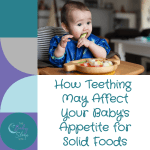
Baby teething can be a tough issue for parents to deal with. While some babies and toddlers seem to just sail through the teething process with minimal pain and fuss, other babies spend days in discomfort and pain. And, of course, discomfort and pain usually translate to NO SLEEP FOR ANYONE. Learning about baby teething symptoms and when teething starts can help a lot!
As if sleep regressions, growth spurts, sleep associations, changing nap schedules, and feeding struggles aren’t enough – a parent has to deal with baby teething pain, too!
No wonder, then, that over the last 15+ years we have gotten SO many questions about baby teething symptoms, and how to manage a teething baby or toddler when it causes sleep disturbances!
Not to worry! When baby teething starts, you don’t have to suffer through teething drama alone. In this post, we’re looking at 3 tips to help manage your baby’s teething discomfort and sleep disturbances, as well as info on how you can offer comfort without undoing any sleep training progress you’ve made up to this point.
Baby Teething Symptoms
First, let’s examine some common baby teething symptoms so that you can watch for signs of teething and be proactive. Baby teething symptoms include the following:
- Drooling which can also cause a teething rash, a chapped, red chin from the drool
- Red and sore gums
- Diaper rash due to watery stools from swallowing so much extra saliva
- Diarrhea (from swallowing extra saliva)
- Refusal to feed (tender and sore gums make it tough to nurse and eat comfortably)
- Biting (your baby may chew on hands, toys, or – if you’re breastfeeding – on you!)
- Ear-pulling and/or cheek-rubbing
- Waking frequently at night
- More fussing/crying and irritability than usual
- Low-grade fever (99-100 degrees)
You May Also Be Interested In…
- How Teething Impacts Appetite (for Milk and Solid Foods)
- Sleep Regressions: Everything You Need to Know (maybe it’s not teething at all!)
- Must-Have Teething Products for Babies
When Do Babies Start Teething? How Long Does Teething Last?
Babies start getting teeth between 5 and 10 months of age and according to the American Dental Association, babies will have a full set of 20 teeth by the age of 3 years old. The front teeth are usually first and when I work directly with parents, molars at one and two years old, and eye teeth or canines around 18 months old are the most difficult. So these symptoms will come and go with sleep being affected for 4-5 nights, on average, when a tooth is cutting through the gums.
When Should Your Baby See a Dentist?
You should see a pediatric dentist by 12 months old so they can show you how to clean your baby’s new teeth effectively and avoid cavities. However, some people wait until 18 months to two years old. In some cases, the dentist will seal the molars, so I recommend seeing a dentist sooner rather than later. It can help develop a good relationship from the beginning since many adults hate the dentist. Good oral hygiene helps your overall health.
Baby Teething and Sleep: 3 Tips To Soothe Your Baby and Promote Sleep
If your baby is teething and very uncomfortable, it will almost certainly mess with their sleep schedule, at least for a bit. According to the American Academy of Pediatrics, teething can disrupt sleep though some parents have reported their baby sleeps more than usual.
Fortunately, there are ways you can provide comfort while still preserving good sleep habits, and ensuring you don’t inadvertently help your baby form new sleep associations.
Teething Toys and Teething Rings

These teething devices are meant to massage baby gums to give some relief from the added pressure. And, many of them are designed to be refrigerated or frozen. The coldness can help numb your baby’s sore gums naturally.
But remember, you don’t have to be high-tech with your teething tools…a “homemade” option, like a cold washcloth, can work wonders, too! You can help your baby by gently rubbing a cold washcloth over their gums.
Use Pain Reliever
Teething toys won’t exactly work during times when your child is sleeping (or, rather, is supposed to be sleeping!). If the pain is bad and is keeping your child awake, then try offering pain relievers such as Tylenol or Ibuprofen to help alleviate your baby’s pain. Some families choose to use very diluted essential oils for teething pain. Just be sure to check with your healthcare provider before offering any medication to make sure it’s right for your baby.
You may want to time when you offer pain reliever with when you know your baby or toddler will need to feed. So, for example, try offering a dose right after the bedtime feeding. The medication will last 4-6 hours, and that will maximize the chances that your baby will give you a good, long stretch of sleep at the start of the night. Also, you will want to avoid products containing benzocaine! That’s the ingredient proven unsafe for children younger than two years by the Food and Drug Administration in 2018.
Here are a few other medications or treatments (all Benzocaine-free) with your doctor’s approval to consider rather than Ibuprofen or Tylenol:
- Camilia – Homeopathic drops to relieve teething and minor stomach upset
- Hyland’s – Homeopathic oral pain relief
I had my babies quite some time ago, but you will want to experiment with the proper teething remedy for your baby. My second son did well with Ibuprofen but not Tylenol. He would go to sleep pretty quickly after getting some when a tooth was cutting through, but again, be sure to get the green light from your pediatrician before giving any pain relievers.
Baby Teething and Sleep Training
So, what should you do if your child suddenly starts teething during sleep training? We recommend that you keep on sleep training. Now, this is a general recommendation – there are times when teething discomfort may be so intense that you have to just suspend your efforts for a night or two. But in general, we recommend that you don’t stop sleep training due to teething. There will ALWAYS be “issues” that crop up, which will impact your baby’s sleep, and if you were to stop for all of them, you may never get around to teaching your baby better sleep habits! While you might need to moderate your sleep training efforts a bit, and will definitely need to adjust your expectations during teething, it’s usually best to stick with sleep coaching.
We’d also recommend that you don’t make teething an excuse for putting off sleep training, or for suffering through interrupted sleep. Remember, your child will teethe for a 2-3 years on and off – so if you wait until teething is over to start working on sleep, you’ll be waiting for a long time!! That translates to a lot of lost sleep for all of you. You will no doubt always be able to find a reason to avoid or delay sleep coaching, but if your little one’s sleep is truly problematic, then it’s usually best to just start sleep training, and deal with any speed bumps like teething as they crop up. We know that when it comes to sleep training, the first step is usually the hardest to take – but once you take it, you’ll be well on your way to better sleep!
Provide Comfort Without Undoing Progress With Sleep Training
Figure out how you can provide comfort without creating new “bad” sleep habits, or undoing sleep training progress. For instance, if you want to reinforce the habit of sleeping in the crib, avoid bringing your baby into bed with you during bouts of teething pain – instead, hold your baby until she’s calm, but put her back down in her crib to fall back to sleep. You will definitely want to comfort your baby during teething pain, and when the pain is at its worst, you may need to have a night or two when you break all your “rules” but do try to avoid doing anything that you don’t want to do long-term. One night of co-sleeping for comfort won’t hurt, but if you do it every night for two weeks, then you’ve most likely just created a brand-new expectation for your baby.
My plan with my first son was that if he was extra fussy during the day, I’d give him Ibuprofen at bedtime. If he had any night wakings 6+ hours (give or take 1 hour) after the medication, I’d tend to him with another dose and then stay with him for 30 minutes until it kicked in and he was calm, then I’d put him back down. It was usually only about 2-4 days of super fussy times that he needed extra soothing until the tooth popped through. Other times, I’d have to be more stringent on my nighttime visits, because of the problems it would create.
Need more sleep training tips while teething? Become a VIP and unlock more teething and sleep training tips along with access to all our e-books, recordings, workbooks, “Ask the Author” getting answers from a sleep consultant, and more!








